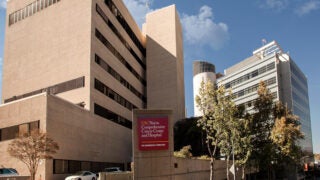The USC Black Alumni Association’s Circle of Support
Two alums share the paths that brought them back to USC and the Black Alumni Association.
To celebrate the 40th anniversary of the USC Black Alumni Association (BAA), two Trojans from different generations share their journeys after graduating from USC—and the paths that brought them back to Troy and the BAA.
The Power of a Helping Hand
Growing up in one of Los Angeles’ toughest housing projects, Leonard Fuller ’68 dreamed of attending college. Instead of going home after school, he’d sneak into Doheny Memorial Library on the University Park Campus and study for hours.
Little did librarians know that he’d one day graduate from USC and turn into an alumni leader. Fuller was elected to the Board of Governors of the USC General Alumni Association (the former name of the USC Alumni Association) in 1992 and later became the organization’s president. He served as a USC trustee for five years.
Fuller’s life changed when his high school principal introduced him to Mark Friedman, a wealthy industrialist and philanthropist. Friedman was so impressed by Fuller, a top scholar and student body president of his high school, that he offered to pay Fuller’s full tuition at USC.
Fuller thrived at USC but felt lonely at times. “There were so few blacks, it was difficult to get to know others,” he remembers. “As enjoyable and intellectually stimulating as it was, I felt that it could have been enhanced by an organized association of African-American students.”
He went on to Harvard Business School and a successful business career, returning to LA in 1990 to start his own consulting firm. “I had been away from Los Angeles for 15 years and I really missed my association with the university,” Fuller adds. He was delighted to discover the BAA.

He’s also established the LaVerne Fuller Endowed Scholarship in honor of his mother to help young scholars achieve the dream he once thought impossible: to attend college.
Bridging Divides
Julia Wilson ’91, CEO and founder of Wilson Global Communications, is a strong advocate of the USC BAA.
“Sometimes students can feel isolated at large institutions where they are the minority,” Wilson says. “The BAA provides black students with a place to express themselves and their ideas freely, and feel included without hesitation.”
Wilson knows from experience—she’s spent much of her professional career exploring and bridging racial and cultural gaps. After graduating from the USC Annenberg School for Communication and Journalism, Wilson launched Good News Magazine to support multicultural relations in LA and hosted and produced the TV program On the Continent, which aired in Africa. She later made history as the first American woman to own and operate an international public relations and marketing firm in the newly democratic South Africa. Wilson is also a U.S. consultant for a Chinese program that awards scholarships to students at historically black colleges and universities to study in China.
“When I was a student at USC, I remember participating in activities that encouraged cross-cultural relationships and interactions,” Wilson says. She led a pluralism organization on campus to promote diversity and received the Order of Troy award as an outstanding senior.
An adjunct professor at USC Annenberg, she stays involved with BAA events, including presenting talks about entrepreneurship and globalization. Wilson, who will receive the BAA’s 2016 Outstanding Alumnus award in March, says that meeting other members and sharing knowledge is all part of the invaluable support BAA provides to USC’s African-American community.
To learn more about USC BAA’s 40th Anniversary and Scholarship Benefit Dinner in March 2016, go to sait.usc.edu/baa or call (213) 740-8342.



